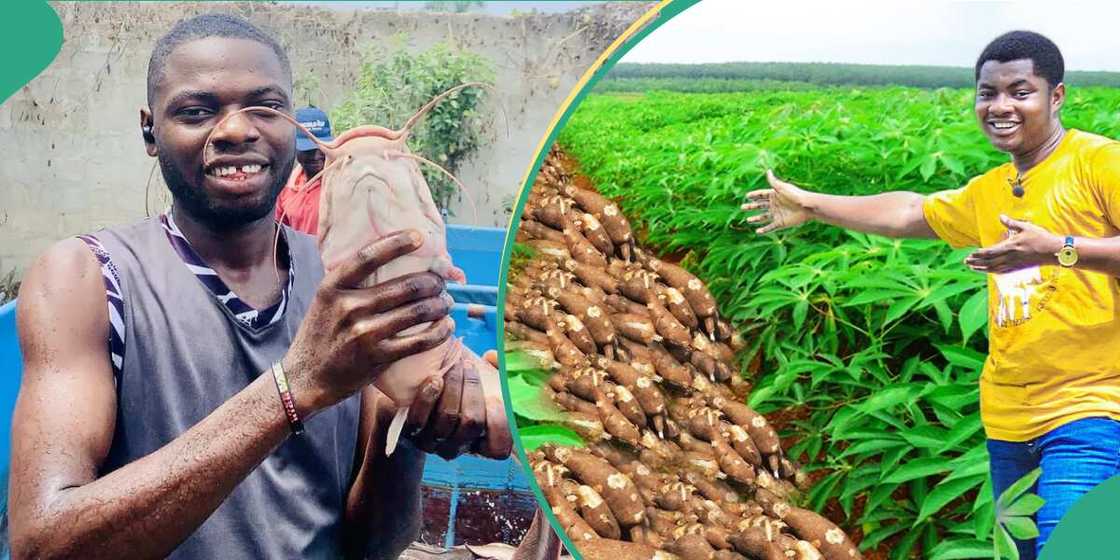5 Agricultural Businesses to Invest In to Increase Your Income in 2024
- The agricultural sector has been one of the most flourishing sectors of the Nigerian economy since the shift from oil
- Several parts of agriculture promise investors significant returns on investment if done the right way
- Legit.ng experts share a few ideas about some of the most lucrative agricultural businesses anyone in Nigeria can start in 2024
Legit.ng journalist Victor Enengedi has over a decade's experience covering Energy, MSMEs, Technology and the stock market.
Nigeria boasts abundant natural resources waiting to be harnessed for the benefit of its populace.
With vast expanses of arable land and a conducive environment conducive to agricultural cultivation and productivity, there lies immense potential.
Here are some agricultural enterprises that individuals can embark upon with minimal capital investment in Nigeria in 2024.

Source: UGC
PAY ATTENTION: Share your outstanding story with our editors! Please reach us through info@corp.legit.ng!
Immense benefit of poultry farming
The poultry industry remains a prevalent and significant sector in Nigeria, despite the prevailing economic challenges.
Its viability stems from its consistent demand, given the essential role poultry products play in our diets.
However, before venturing into this field, it's crucial to acquire the necessary training. Handling live animals necessitates care and expertise, as any negligence could result in significant losses.
Consider enrolling in a course, whether online or in person, to gain clarity and proficiency in poultry management.
This industry encompasses various fowl species such as chicken, goose, turkey, and ducks, offering flexibility in choice.
Starting with chicken could be a prudent initial step, given its widespread popularity and relatively easier management compared to other poultry options.
Farming snails can be lucrative
Snail farming presents a lucrative opportunity that warrants further exploration. With the potential to yield significant income in a relatively short timeframe, it's a venture worth considering.
Establishing suitable housing for your snails is essential, providing ample space for them to graze freely.
Overcrowding must be avoided at all costs, as it can hinder the snails' development. To kickstart your operation, acquiring healthy, fresh snails is necessary.
Henry Akpor Etineh, the CEO of Arapel Agro Farms Limited specialises in growing giant African land snail species for various purposes like meat, pet, slime, calcium, and snail blood.
He told Legit.ng that even though he is unable to meet growing demand, he earns an average of seven figures annually.
He said:
"Snail farming business contributes its quota to the nation's gross domestic product (GDP). The shells from the snails are raw materials for manufacturing industries, and having more people getting into snail farming reduces unemployment."
Become a catfish supplier
The catfish industry has become ubiquitous, yet there's ample opportunity to carve out a unique niche for yourself based on the quality of your service.
You can become a major supplier of catfish to the numerous restaurants, lounges and relaxation joints across your city.
Getting started requires minimal space or land, typically in the form of a fish pond constructed from concrete or plastic.
Access to clean water is paramount, considering it serves as the natural habitat for fish and directly influences their well-being and growth.
Julius Nseke, a fish farmer based in Lagos, told Legit.ng that catfish farming can be lucrative when properly packaged for export.
He said:
"In recent times, numerous individuals have ventured into large-scale catfish exportation. This industry has prompted individuals to explore international markets, given the demand for catfish beyond the borders of Nigeria.
"Typically, the fish is processed by drying or smoking it before being meticulously packaged in nylon for overseas shipment. The nutritional value of catfish has attracted a considerable number of buyers, both domestically and internationally."
Cassava farming for garri and others
In Nigeria, cassava is a staple crop deeply ingrained in our consumption habits. Given its vital role in sustaining our nutritional needs and overall bodily functions, the demand for cassava products remains constant.
Notably, cassava farming stands out as one of the most lucrative agricultural ventures in Nigeria today.
To embark on this business endeavour, securing farmland is imperative for establishing your cassava plantation.
In cases where land ownership isn't feasible, renting fertile soil is a viable option.
Maize, an important staple food in Nigeria
Maize, a widely recognized crop, plays a crucial role in food production across various regions. In Nigeria, maize farming flourishes due to favourable conditions.
Timely planting, preferably at the onset of the rainy season, significantly impacts crop yield.
Effective weed management is essential to ensure optimal growth, as weeds compete with maize for sunlight, water, and nutrients.
It's advisable to avoid land with trees, clayey soil, and ant hills, as they can impede maize cultivation.
Investing in agriculture in Nigeria can be a lucrative opportunity due to the country's vast arable land, growing population, and increasing demand for food products.
With the right approach, such as modern farming techniques, infrastructure development, and leveraging technology, investors can capitalize on the sector's potential for high returns.
However, it's crucial to conduct thorough research, understand the local market dynamics, and address challenges like access to finance, logistics, and regulatory hurdles to mitigate risks and ensure sustainable profitability.
Four Nigerian agric-tech startups empowering farmers
In related news, Legit.ng reported how four Nigerian agricultural tech startups are empowering hundreds of thousands of smallholder farmers.
In addition to empowering farmers, the startups have also provided avenues for ordinary Nigerians to invest and make money from agriculture.
They have been able to eliminate the fear of investing in the agricultural sector through the use of technology and reduce the dependence on government intervention funds for farmers.
PAY ATTENTION: Donate to Legit Charity on Patreon. Your support matters!
Source: Legit.ng








